初一一般现在时态精讲讲解
11.一般现在时(精讲)
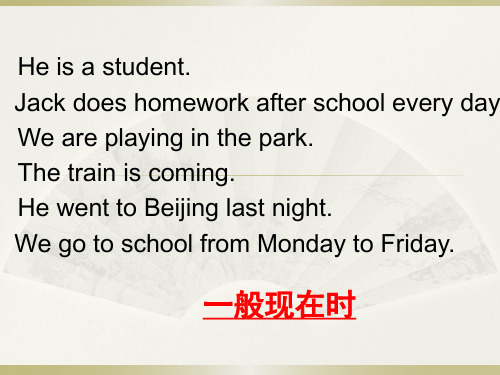
写出下列单词的的第三人称单数形式 miss____ go_____ pass____ take_____ do______ wash____ stand____ carry_____ stay_____ read______ watch_____ collect______ have_____ sit________ play_______ fly________ walk______ study_______ teach______ jump_____ come_____ live_____ cry_______ run________ make______ swim_______ make____ like_______
1.You must_____( go/ going). 2.He can___(play/plays) football. 3.Mother can ___(cook/ cooking). 4. Father can __(drive/drives) the bus, but he is not___(drive/ driving) now. 5. Must I ___(clean/cleans) the room? 6. You can‘t ___(cross/crossing) the street now. 7. Linda mustn‘t ___(eat/eating). She wants to keep thin. 8. I can‘t __(eat/eating) and __(is/be)beautiful. 9. You must __(do/did) your homework first. 10. May I ___(sitting/ sit) here?
初一英语一般现在时态讲解之欧阳语创编

初一英语一般现在时态讲解一、二、定义与讲解一般现在时表示经常或习惯性的动作或一般性事实。
也可表示现在的状态或主语具备的性格和能力。
通常与副词every day(每天),always(总是),usually(通常),often(经常)sometimes(有时),等时间状语连用。
例:(1)表示事物或人物的特征、状态。
The sky is blue.天空是蓝色的。
Mary’s father is a n English teacher. 玛丽的爸爸是一名英语老师。
(2)表示经常性或习惯性的动作。
I go to school at seven every day.我每天六点去上学。
She plays sports every day. 她每天都做运动。
(3)表示客观现实。
The table has four legs.桌子有四条腿。
There are 63 students in my class. 我们班有63个学生。
(4)表示客观真理,科学原理,自然现象,等客观事实或格言谚语等。
The sun rises in the east every day.太阳每天从东方升起。
The earth goes around the sun.地球绕着太阳转。
(5)表示平日的喜好。
I like bananas. We don’t like vegetables.He likes blue. She doesn’t like strawberries.二、只有主语在第三人称单数时在陈述句里面实义动词用“三单形式”,其他人称(一,二,三复)用动词原形。
e.g.I/ We like English very much. 我/我们非常喜欢英语。
She/ He/His sister likes English very much. 她/他/她的妹妹非常喜欢英语★动词三单形式的变化规则:1.(1)多数直接在动词词尾加-s.play — plays like — likesask---askswork---works get---gets call---calls(2)以字母s, x, ch, sh或o结尾的动词,在词尾直接加-es.watch---watches wash---washes do---does go---goes(3)以“辅音字母加 - y”结尾的动词,要先变y为i再加-es.try---tries study---studies cry---cries fly---flies2.不规则变化:be---- is have----has一般现在时态肯定句式:分为含有be动词和实义动词的两种情况:一.含有be动词的一般现在时的句式:肯定句式:主语+be+表语(n./adj.等)e.g. ①He is a worker. 他是个老师②You are nine. 你9岁。
英语语法一般现在时态
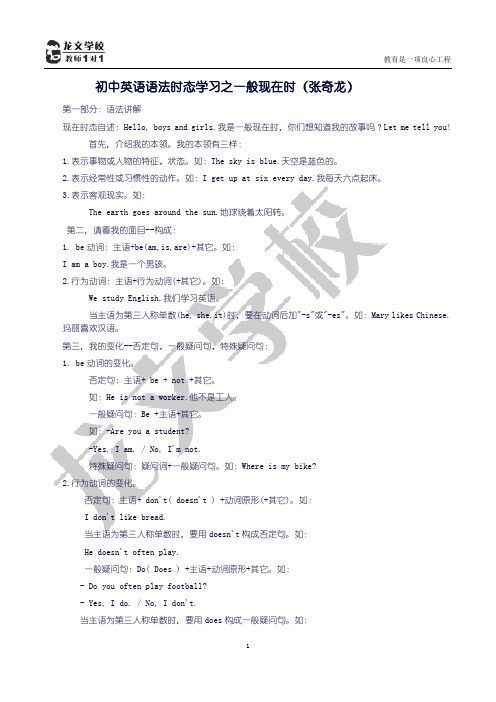
初中英语语法时态学习之一般现在时(张奇龙)第一部分:语法讲解现在时态自述:Hello, boys and girls.我是一般现在时,你们想知道我的故事吗?Let me tell you!首先,介绍我的本领。
我的本领有三样:1.表示事物或人物的特征、状态。
如:The sky is blue.天空是蓝色的。
2.表示经常性或习惯性的动作。
如:I get up at six every day.我每天六点起床。
3.表示客观现实。
如:The earth goes around the sun.地球绕着太阳转。
第二,请看我的面目--构成:1. be动词:主语+be(am,is,are)+其它。
如:I am a boy.我是一个男孩。
2.行为动词:主语+行为动词(+其它)。
如:We study English.我们学习英语。
当主语为第三人称单数(he, she,it)时,要在动词后加"-s"或"-es"。
如:Mary likes Chinese.玛丽喜欢汉语。
第三,我的变化--否定句、一般疑问句、特殊疑问句:1. be动词的变化。
否定句:主语+ be + not +其它。
如:He is not a worker.他不是工人。
一般疑问句:Be +主语+其它。
如:-Are you a student?-Yes. I am. / No, I'm not.特殊疑问句:疑问词+一般疑问句。
如:Where is my bike?2.行为动词的变化。
否定句:主语+ don't( doesn't ) +动词原形(+其它)。
如:I don't like bread.当主语为第三人称单数时,要用doesn't构成否定句。
如:He doesn't often play.一般疑问句:Do( Does ) +主语+动词原形+其它。
如:- Do you often play football?- Yes, I do. / No, I don't.当主语为第三人称单数时,要用does构成一般疑问句。
初中英语八大时态-讲解ppt课件
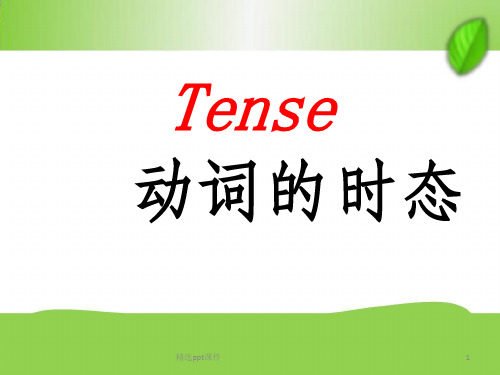
D.have;left
精选ppt课件
18
六、过去将来时
1.用法:从过去看将要发生的动作。
2.结构:would was/were/going to +v.(原型)
例题
1.--What did he say yesterday?
--He said he____to Sydney next week.
A.goes B.will go
在有关的过去动作用现在完成,与现在 无关的过去动作用一般过去。)
4.易错点:
1 have gone to+地点,表示“去了某地”。
(人已走,尚未回。只用于第三人称。)
They have gone to Europe.
(They are not here.)
精选ppt课件
22
2 have been to+地点,表示“去过某
C.would go D.are going
2.--Did your son fail his English exam once again?
--Yes, but he told me he____hard next term.
A.studies B.is studying C.wil--When____we have the meeting? ---At 8.
A.are B.shall
C.would D.will
4.--When___you___for London? --Next week.
A.will;leaving
B.are;leaving
C.shall;leave
A.are work
B.are worked
C.work
七年级一般现在时讲解
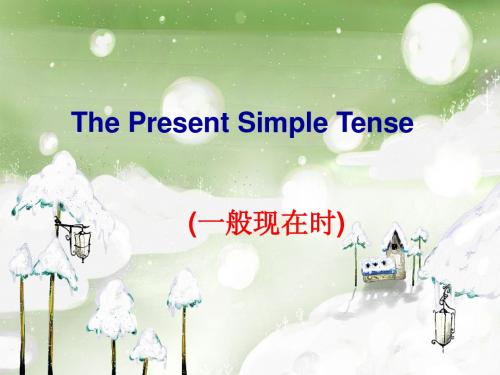
肯定句:is/am/are
否定句:is/am/are not
一般疑问句:把be 动词提到句 首,小写改为大写,其他的词不 No, he is not.(isn’t) 变,句号变为问号。
Are they students? No, they are not.
Practice:
Fill in the blanks with the words gave.
6.We_______ ________(not have)much work don’t have to do today. 7.____ you want to be (be) a policeman? ____ Do
Homework:
Take notes Review what we have leant today .
I like bananas. He likes bananas. She likes bananas. They like bananas.
Do and think:
They do not like bananas.
一般疑问句:
Do you have bananas? Does he like bananas? Does she like bananas? Do they like bananas?
You like bananas.
She likes bananas.
He likes bananas.
动词原型
are have like play get teach wash relax do go
fly
is has likes plays gets teaches washes relaxes does goes flies
(七年级英语)一般现在时的讲解
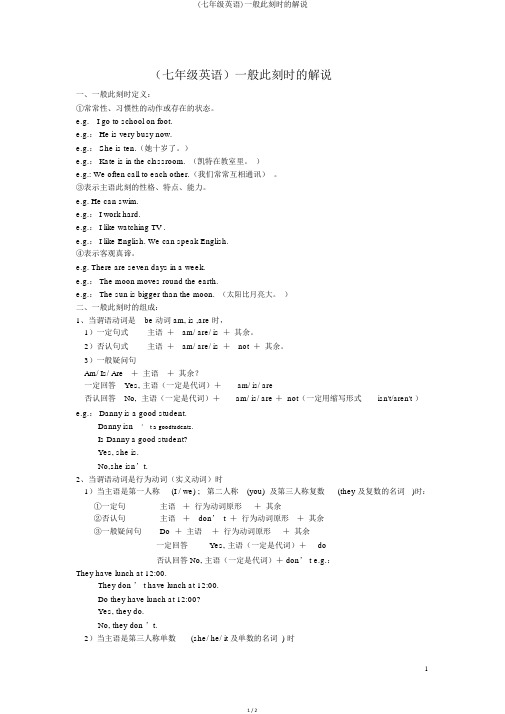
(七年级英语)一般此刻时的解说一、一般此刻时定义:①常常性、习惯性的动作或存在的状态。
e.g. I go to school on foot.e.g.: He is very busy now.e.g.: She is ten.(她十岁了。
)e.g.: Kate is in the classroom.(凯特在教室里。
)e.g.: We often call to each other.(我们常常互相通讯)。
③表示主语此刻的性格、特点、能力。
e.g. He can swim.e.g.: I work hard.e.g.: I like watching TV .e.g.: I like English. We can speak English.④表示客观真谛。
e.g. There are seven days in a week.e.g.: The moon moves round the earth.e.g.: The sun is bigger than the moon.(太阳比月亮大。
)二、一般此刻时的组成:1、当谓语动词是be 动词 am, is ,are 时,1)一定句式主语+am/ are/ is+其余。
2)否认句式主语+am/ are/ is+not+其余。
3)一般疑问句Am/ Is/ Are+主语+其余?一定回答Yes, 主语(一定是代词)+am/ is/ are否认回答No, 主语(一定是代词)+am/ is/ are + not(一定用缩写形式isn't/aren't )e.g.: Danny is a good student.Danny isn’ t a goodtudents.Is Danny a good student?Yes, she is.No,she isn’t.2、当谓语动词是行为动词(实义动词)时1)当主语是第一人称(I / we) ;第二人称(you) 及第三人称复数(they 及复数的名词)时:①一定句主语+行为动词原形+其余②否认句主语+don’ t+行为动词原形+其余③一般疑问句Do +主语+行为动词原形+其余一定回答Yes, 主语(一定是代词)+do否认回答 No, 主语(一定是代词)+ don’ t e.g.:They have lunch at 12:00.They don ’ t have lunch at 12:00.Do they have lunch at 12:00?Yes, they do.No, they don ’t.2)当主语是第三人称单数(she/ he/ it 及单数的名词 ) 时①一定句主语+行为动词的单三形式+其余②否认句主语+doesn’ t+行为动词原形+其余③一般疑问句Does +主语+行为动词原形+其余一定回答Yes, 主语(一定是代词)+does否认回答No, 主语(一定是代词)+doesn’ te.g.: Jenny speaks English very well.Jenny doesn’ t speak English very well.Does Jenny speak English very well?Yes, she does.No, she doesn’t.3.当谓语动词是神态动词+行为动词时:1)一定句主语+(神态动词+行为动词原形)+其余2)否认句主语+(神态动词+not+行为动词原形)+其余3)一般疑问句神态动词+主语+行为动词原形+其余?一定回答Yes, 主语(一定是代词)+神态动词否认回答No, 主语(一定是代词)+神态动词+not(一定是缩写形式 can’t, mustn’t, should n’t, needn’t等)e.g.: Tom can speak Chinese. 汤姆会说汉语。
初中语法之一般现在时和现在进行时讲解
【知识目标1】英语国际音标(48个)【知识目标2】针对性解决:肯定陈述句/否定句/一般疑问句及肯定、否定回答/对划线部分提问等句型的转换。
Eg1: He is a student.(肯定陈述句)Eg2: She works hard.(肯定陈述句)He is not a student.(否定句)She doesn't work hard.(否定句)Is he a student.(一般疑问句)Does she work hard?(一般疑问句)Yes, he is./ No, he isn't. Yes, she does./ No, she doesn't.What is he? 特殊疑问句)How does he work?(特殊疑问句)【解题思路】【肯定陈述句】变【否定句】,加"not"Step1:当句子中存在Be动词(am, is, are),或情态动词(如can, may,could,might等),直接在be动词和情态动词后加not (注意:is not=isn't are not=aren't ,can not =can't, could not =couldn't )Step 2:当句子中不存在Be动词和情态动词,需借用助动词(do/does, did)的否定形式(don't/doesn't/didn't)【肯定陈述句】变【一般疑问句】(一调,二改,三问号)Step1:当【肯定句】中存在Be动词,直接将be动词调句首,人称进行改变(第一人称变第二人称,其余人称不变)后照抄,将句号改问号。
一般现在时与现在进行时一般现在时和现在进行时是初一阶段所学的两种重要时态,现从以下三个方面对其进行对比,以便更好的掌握它们的用法。
一、基本用法一般现在时一般用来表示人或物经常性或习惯性的动作或状态,也可以用来表示人或物现在的状态或者用来表示主语现在具有的性格或能力等。
一般现在时态初级讲解
你来试试把这个句子变为否定 句,再变为一般疑问句并回答。
He hቤተ መጻሕፍቲ ባይዱs a brother.
否定句:He doesn’t have a brother.
一般疑问句:Does he have a brother? Yes,he does。\ No, he doesn’t.
在这里do和does叫做助动词,它们没有词 义,它们之所以叫助动词就是因为它们是帮助 动词变否定句或疑问句的。那么,通过以上的 学习,什么时候用助动词do,什么时候用助动 词does,你知道吗? 这取决于句子的主语。 主语不是第三人称单数,就用do; 主语是第三人称单数,就用does。
(一)当主语不是第三人称单数时的三种句式
1.肯定句:主语 + 行为动词原形 + 其他。 We have two books. 2.否定句:主语 + do + not + 行为动词原形 + 其他。 We do not have two books. ( do not = don’t ) 3. 疑问句:Do + 主语 + 行为动词原形 + 其他? Do you have two books? ( 第一人称变为第二人称 ) Yes, we do.\ No, we don’t. (注意该回答和汉语不一样,不可写为Yes, we have. \ No, we have not.这是错误的。)
二、情态动词的一般现在时
情态动词的一般现在时态和be动词的一般现在时态 的否定句和疑问句变法有共同之处,你能看出来吗? 1.肯定句:主语 + 情态动词 + 动词原形+其他 。 They can play baseball(打棒球). 2.否定句:主语 + 情态动词 + not+ 动词原形+其他. They can not play baseball. 3.疑问句: 情态动词+主语 + 动词原形+其他? Can they play baseball? Yes, they can. \ No, they can’t.
(最新整理)初一英语一般现在时态讲解
初一英语一般现在时态讲解
初一英语一般现在时态讲解
编辑整理:
尊敬的读者朋友们:
这里是精品文档编辑中心,本文档内容是由我和我的同事精心编辑整理后发布的,发布之前我们对文中内容进行仔细校对,但是难免会有疏漏的地方,但是任然希望(初一英语一般现在时态讲解)的内容能够给您的工作和学习带来便利。
同时也真诚的希望收到您的建议和反馈,这将是我们进步的源泉,前进的动力。
本文可编辑可修改,如果觉得对您有帮助请收藏以便随时查阅,最后祝您生活愉快业绩进步,以下为初一英语一般现在时态讲解的全部内容。
七年级一般现在时讲解及练习精
一般现在时讲解及练习一、一般现在时的定义:(1)表示平时经常发生的事情(2)表示现在的状态如果问同学们你们每天都在干什么?你们会回答:如果问你喜欢英语吗?你会回答:这时我们会用到一般现在时二、将下列主语和谓语动词划出来例子:I do my homework in the evening.1.We have dinner at school.2.She likes pears.3.I go to school at half past six.4.He always jeans and trainers.5.Daming's uncle likes reading and he reads a lot of novels and magazines.总结:当主语为第三人称单数时,谓语动词会发生怎样的变化?三、将下列动词变为第三人称单数形式eat get tay havedo go like playbuy watch make finishlive read listen drinkswim run变法有以下几种情况:(一)一般动词(二)以s,x,sh,ch,辅音字母+o结尾的动词(三)以y结尾的动词有两种情况 A 以元音字母+y结尾的 B 以辅音字母+y结尾的(四)特殊动词have练习:将下列三个句子做主语替换练习(将主语分别替换为he, she , my sister, Tom, they , my parents ...)1.I like reading.2 We speak Chinese.3 She goes to school every day.四、将下列句子变为一般疑问句及否定句并观察其变法I often get up at six o'clock.Do you often get up at six o'clock ?I don't often get up at six o'clock.1.We play football in the afternoon.2.I usually send emails to my friend.3.They do their homework on the computer .4.Tom and Tony have breakfast at home.5.I live in China.总结:当主语为第一、二人称或第三人称复数时,一般疑问句变法:否定句变法五、将下列句子变为一般疑问句及否定句并观察其变法She wears silk shirts.Does she wear silk shirts? She doesn't wear silk shirts.1 He usually listens to music.2 She gets up early.3 My brother likes maths.4 The boy runs in the morning.总结:当主语为第三人称单数时,一般疑问句变法为:否定句变法为:综合练习:一、用所给动词的正确形式填空1 The camel __________( eat ) grass.2 They ________( live) in the desert.3 I ________( like ) playing basketball.4 My aunt usually _________( make) a cake.5 She often _________( buy ) presents for her family.6 Linda __________( sing ).7 We _________( have ) a great time.8 My friends ____________( like ) birthdays.9 My aunt and uncle usually _____________( remember ) our birthdays.10 Mr. Li _________( come ) from England.二、用don't和doesn't完成句子1 Daming and Lingling ____________( not have ) lunch at home.2 Daming _________( not drink ) Coke.3 They ________________(not read ) magazines.4 We _______________( not play ) computer games.5 Betty _______________( not watch ) TV in the evening.三、分别用do和does写出一般疑问句并回答you , go to bed, at half past ten ?Do you go to bed at half past ten ? Yes, I do. / No, I don't.1 monkeys , come from, Africa ?2 she , like, English3 he , play computer games ?4 they , have a computer ?5 your mother , watch TV, in the evening?6 your teacher , speak English ?。
- 1、下载文档前请自行甄别文档内容的完整性,平台不提供额外的编辑、内容补充、找答案等附加服务。
- 2、"仅部分预览"的文档,不可在线预览部分如存在完整性等问题,可反馈申请退款(可完整预览的文档不适用该条件!)。
- 3、如文档侵犯您的权益,请联系客服反馈,我们会尽快为您处理(人工客服工作时间:9:00-18:30)。
初一英语一般现在时态讲解 一、定义与讲解 一般现在时表示经常或习惯性的动作或一般性事实。,也可表示现在的状态或主语具备的性格和能力。 通常与副词every day(每天),always(总是),usually(通常),often(经常)sometimes(有时),等时间状语连用。 例:(1)表示事物或人物的特征、状态。 The sky is blue.天空是蓝色的。 Mary’s father is an English teacher. 玛丽的爸爸是一名英语老师。 (2)表示经常性或习惯性的动作。 I get up at six every day.我每天六点起床。 She plays sports every day. 她每天都做运动。 (3)表示客观现实。 The table has four legs.桌子有四条腿。 There are 50 students in my class. 我们班有50个学生。 (4)表示客观真理,科学原理,自然现象,等客观事实或格言谚语等。 The sun rises in the east every day.太阳每天从东方升起。 The earth goes around the sun.地球绕着太阳转。 (5)表示平日的喜好。 I like bananas. We don’t like vegetables. He likes ice cream. She doesn’t like strawberries. 二.只有主语在第三人称单数时用动词的“三单形式”, 其他人称用动词原形。 ★ 动词三单形式的变化规则: 1.(1)多数直接在动词词尾加-s. play — plays like — likes ask---asks work---works get---gets call---calls doesn’t变成否定句,切记:助动词后的动词则还原成动词原形。
例:①陈述句:We get up(起床) at 7:00 every morning. 疑问句→Do you get up at 7:00 every morning? 否定句→We don’t get up at 7:00 every morning. ②陈述句:She has a brother. 疑问句→ Does she have a brother? 否定句→ She doesn’t have a brother.
※ 在一般现在时中,当主语是第三人称单数时,谓语动词要用第三人称单数形式,即常在动词原形后加-s或-es。 但有些同学们对于哪些主语是第三人称单数还不十分清楚, 现归纳总结如下: 一、人称代词he, she, it是第三人称单数。如: He likes watching TV. 他喜欢看电视。 She has lunch at twelve. 她十二点吃午餐。 二、单个人名、地名或称呼作主语;是第三人称单数。如: ①Han Mei likes salsd . 韩梅喜欢萨拉。 ②Beijing is in China. 北京在中国。 ③Uncle Wang often plays volleyball.. 王叔叔经常打排球。 三、单数可数名词或"this / that / the+单数可数名词"作主语时,是第三人称单数。如: ②This book is yours. 这本书是你的。 ③That car is red. ④The cat is Lucy's. 这只猫是露茜的。 四、不定代词someone, somebody, nobody, everything, something等及指示代词this, that作主语时,是第三人称单数。①Everyone is here. 大家到齐了。 ②There is a watch on the table. 桌上有块手表。 ③This is a pen. 这是一支钢笔。④That is an eraser. 五、不可数名词作主语时为第三人称单数。如: ①The milk(牛奶) is in the glass. 牛奶在玻璃杯里。 ②The bread is very small. 那面包很小。 六、当数字或字母作主语时,看作第三人称单数。如: ①"6" is a lucky number. "6"是个吉利数字。 ②"I" is a letter. "I"是个字母。 巩固练习题: 一、按照要求改写句子 1.This is my pencil ? (变一般疑问句) your pencil ? 2. These red socks are Kate’s . (变一般疑问句) socks Kate’s ? 3. Mary does not have any books . (变肯定句) Mary books . 4. She likes the black bag very much . (变为否定句) 5. I like apples. (用she改写句子) 6. It’s an English dictionary . (对画线部分提问) . 7. He has hamburger and apples for dinner . (变一般疑问句) 二、用Be动词填空。 1. you Li Fen ? No, not . 2. Mr. green very busy? Yes , he . 3..This book very interesting . 4. What class you in ? 5. You and I good friends . 6. The basketball club fun . 三.用所给动词的适当形式填空。 1. Lin Tao (like) his ruler . 2. Let’s (have) ice cream . 3. Let’s (play) tennis ! 4. He (like) English. 5. Nice (meet) you ! 6. I (need) some fruits. 一般现在时用法专练:
一、 写出下列动词的第三人称单数形式。 have like drink _____ go _____ stay ____ make ______look ______have____ come_____ watch______ plant_____ fly _____ do_____ study___ _ teach_____ 二、用括号内动词的适当形式填空。 1. He often ________(have) dinner at home. 2. Daniel and Tommy _______(be) in Class One. 3. We ____ ___(not watch) TV on Monday. 4. Nick ____ ___(not go) to the zoo on Sunday. 5. ______ they ________(like) pears? 6. _______ your parents _______(have) eggs every day? 7. There ________(be) some water in the bottle. 18. Mike _______(like) cooking. 9. They _______(have) the same hobby. 10. Liu Tao ______ _(do) not like PE. 11. This boy often _______(watch) TV in the evening. 三、按照要求改写句子 1. Daniel watches TV every evening.(改为否定句) ___________________________________________________ 2. I do my homework every day.(改为一般疑问句,作否定回答) ___________________________________________________ 3. She likes milk.(改为一般疑问句,作肯定回答)
___________________________ 4. Amy likes playing computer games.(改为一般疑问句,作否定回答)
___________________________________________________ 5. We go to school every morning.(改为否定句)
__________________________________________________ 6. John comes from Canada(加拿大).(对划线部分提问)
___________________________________________________ 7. She is a good student.(改为一般疑问句,作否定回答)
___________________________________________________ 8. Simon and Daniel like play sports .(改为否定句)
___________________________________________________ 五、改错(划出错误的地方,将正确的写在横线上) 1. Is your brother speak English? __________________ 2. Does he likes going fishing? ________________ 3. He likes play games after class. _______________ __ 4. Mr. Wu teachs us English. _______________ 5. She don’t do her homework on Sundays. _____________ 六.改句子 1. Do you often play football after school? (肯定回答) 2. I have many books. (改为否定句) 3. Gao Shan’s sister likes playing table tennis (改为否定句) 4. I watch TV every day. (改为一般疑问句) 一般现在时态句型转换(七年级上册unit1-6) 1. This is a white key. (对画线部分进行提问) 2. Ben’s bag is yellow and red . (对画线部分进行提问)
